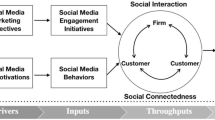Abstract
El-Ansary et al. (AMS Review. https://doi.org/10.1007/s13162-017-0102-y, 2017) provide a 100-year historical review of the concepts and paradigms that have led to an identity crisis in marketing. This commentary is a retrospective review, contributing to the understanding of the evolution of concepts and changes in the marketing discipline which have precipitated this identity crisis. In addition, progress in the development of marketing theory is examined to determine if there are major theories or frameworks that can assist in resolving the identity crisis. Concerns about the current narrow focus on consumer behavior, modeling, and methodological sophistication have resulted from the failure of the marketing discipline to determine appropriate research agenda and topics important in marketing education. A marketing systems paradigm is considered for resolving this identity crisis in academia and industry.
Similar content being viewed by others
References
Alderson, W. (1957). Marketing behavior and executive action. Homewood, IL: Richard D. Irwin.
Alderson, W. (1965). Dynamic marketing behavior: A functionalist theory of marketing. Homewood, IL: Richard D. Irwin.
Alderson, W., & Green, P. E. (1964). Planning and problem solving in marketing. Homewood, IL: Richard D. Irwin.
Aspinwall, L. (1958). The characteristics of goods and parallel systems theories. In E. J. Kelley & W. Lazer (Eds.), Managerial Marketing: Perspectives and Viewpoints (pp. 434–450). Homewood: Irwin.
Bagozzi, R. P. (1974). Marketing as an organized behavioral system of exchange. Journal of Marketing, 38(4), 77–81.
Bagozzi, R. P. (1977). Is all social exchange marketing?: A reply as exchange. Journal of the Academy of Marketing Science, 5(3), 315–325.
Bartels, R. (1962). The development of marketing thought. Homewood, IL: Richard D. Irwin, Inc..
Bartels, R. (1974). The identity crises in marketing. Journal of Marketing, 38(4), 73–76.
Bartels, R. (1976). The history of marketing thought (2nd ed.). Columbus, OH: Grid.
Bartels, R. (1988). The history of marketing thought (3rd ed.). Columbus, OH: Publishing Horizons.
Carpenter, G. S. (2017). Market orientation: reflections on field-based, discovery-oriented research. AMS Review, 7(1–2), 13–19.
Copeland, M. T. (1924). Principles of merchandising. Chicago: A.W. Shaw.
Cox, R., Alderson, W., & Shapiro, S. J. (1964). Theory in marketing. Homewood, IL: Richard D. Irwin.
El-Ansary, A., Shaw, E. H., & Lazer, W. (2017). Marketing’s identity crisis: insights from the history of marketing thought. AMS Review. https://doi.org/10.1007/s13162-017-0102-y.
Ferrell, O. C., & Perrachione, J. R. (1980). An inquiry into Bagozzi’s formal theory of marketing exchanges. In C. W. Lamb & P. M. Dunne (Eds.), Theoretical Developments in Marketing (pp. 158–159). Chicago: American Marketing Association.
Ferrell, O. C., Brown, S. W., & Lamb Jr., C. W. (1979). Conceptual and theoretical developments in marketing. Chicago: American Marketing Association.
Ferrell, O. C., Ferrell, L., & Sawayda, J. (2014). A historical review and reconceptualization of commodity marketing. In Enke et al. (Hrsg.), Commodity Marketing (pp. 431–447).
Ferrell, O. C., Hair, J. F., Marshall, G. W., & Tamilia, R. D. (2015). Understanding the history of marketing education to improve classroom instruction. Marketing Education Review, 25(2), 159–175.
Firat, A.F., Dholakia, N., & Bagozzi, R. (1987). Philosophical and radical thought in marketing. Lexington Books.
Fisk, G. (1967). Marketing systems: An introductory analysis. NY: Harper and Row.
Fisk, G. (1971). New essays in marketing theory. Boston: Allyn and Bacon.
Gatignon, H., Lecocq, X., Pauwels, K., & Sorescu, A. (2017). A marketing perspective on business models. AMS Review, 7(3–4), 85–89.
Holbrook, M. B. (2003). Adventures in complexity: An essay on dynamic open complex adaptive systems, butterfly effects, self-organizing order, coevolution, the ecological perspective, fitness landscapes, market spaces, emergent beauty at the edge of chaos, and all that jazz. Academy of Marketing Science Review, 6, 1–181.
Hollander, S. (1997). Is that going to be on the exam? Almost 50 years of general marketing textbooks. In D. G. Brian Jones & P. Cunningham (Eds.), Marketing history know no boundaries (Vol. 8, pp. 43–45). East Lansing: Board of Trustees, Michigan State University.
Houston, M. (2016). Is 'strategy' a dirty word? Journal of the Academy of Marketing Science, 44(5), 557–561.
Howard, J., & Sheth, J. (1969). The theory of buyer behavior. New York: John Wiley.
Hult, G. T. M., & Ketchen, D. J. (2017). Disruptive marketing strategy. AMS Review, 7(1–2), 20–25.
Hult, T., Closs, D., & Frayer, D. (2014). Global supply chain management. McGraw Hill.
Hunt, S. D. (1976). The nature and scope of marketing. Journal of Marketing, 40(July), 17–28.
Hunt, S. D. (2000). A general theory of competition: resources, competences, productivity, economic growth. Thousand Oaks, CA: Sage Publications, Inc..
Hunt, S. D. (2010). Doctoral seminars in marketing theory. Historical Research in Marketing, 2(4), 443–456.
Hunt, S. D. (2017). Strategic marketing, sustainability, the triple bottom line, and resource-advantage (R-A) theory: Securing the foundations of strategic marketing theory and research. AMS Review, 7(1–2), 55–66.
Jaworski, B. J., & Kohli, A. K. (2017). Conducting field-based, discovery-oriented research: Lessons from our market orientation research experience. AMS Review., 7(1–2), 4–12.
Jones, D. G. B., & Monieson, D. D. (1987). Origins of the institutional approach in marketing. In T. Nervett & S. Hollander (Eds.), Marketing in three eras (Vol. 3, pp. 149–168). East Landing: Board of Trustees, Michigan State University.
Katona, G. (1951). Psychological analysis of economic behavior. New York, NY, US: McGraw-Hill.
Kelley, E. J., & Lazer, W. (1958). Managerial marketing: perspectives and viewpoints. Homewood: Richard D. Irwin.
Kennedy, A. (2017). Macro-social marketing research. Journal of Macromarketing, 37(4), 347–355.
Kohli, A. K., & Jaworski, B. J. (1990). Market orientation: The construct, research propositions, and managerial implications. Journal of Marketing, 54(April), 1–18.
Kohli, A. K., Jaworski, B. J., & Kumar, A. (1993). MARKOR: A measure of market orientation. Journal of Marketing Research, 30, 467–477.
Kotler, P. (1972). A generic concept of marketing. Journal of Marketing, 36(2), 46–54.
Kotler, P., & Levy, S. J. (1969). Broadening the concept of marketing. Journal of Marketing, 33(1), 10–15.
Kotler, P., & Zaltman, G. (1971). Social marketing: An approach to planned social change. Journal of Marketing, 35(July), 3–12.
Kotler, P., Ferrell, O. C., & Lamb, C. W. (1983). Strategic marketing for nonprofit organizations: Cases and readings. Englewood Cliffs, NJ: Prentice-Hall.
Kumar, V. (2015). Evolution of marketing as a discipline: What has happened and what to look out for. Journal of Marketing, 79(1), 1–9.
Luck, D. (1969). Broadening the concept of marketing – too far. Journal of Marketing, 33(3), 52–55.
Luck, D. (1974). Social marketing: confusion compounded. Journal of Marketing, 38(October), 70–72.
Lusch, R. F., & Vargo, S. L. (2006). Preface. In R. F. Lusch & S. L. Vargo (Eds.), The service-dominant logic of marketing (pp. xvii–xviii). Armonk, NY: M.E. Sharpe.
McAlister, L. (2016). Rigor versus method imperialism. Journal of the Academy of Marketing Science, 44(5), 565–567.
Narver, J. C., & Slater, S. F. (1990). The Effect of a market orientation on business profitability. Journal of Marketing, 54(April), 20–35.
Nickels, W. G. (1974). Conceptual conflicts in marketing. Journal of Economics and Business, 27(1), 140–143.
Nyström, A.-G., & Mustonen, M. (2017). The dynamic approach to business models. AMS Review, 7(3–4), 123–137.
Reibstein, D.J., Day, G., & Wind, J. (2009, July). Guest editorial: Is marketing academia losing its way? Journal of Marketing. pp. 1–3.
Robertson, T. S. (2017). Business model innovation: a marketing ecosystem view. AMS Review, 7(3–4), 90–100.
Sett, R.K. (2017). Market orientation – firm performance link in a dynamic environment: looking inside the black box. AMS Review.
Shaw, A. W. (1912). Some problems in market distribution. Quarterly Journal of Economics, 26(August), 706–765.
Sheth, J., Gardner, D., & Garrett, D. (1988). Marketing theory evolution and evaluation. New York: John Wiley.
Steenkamp, J. M. (2018, March). The future of the marketing department at business schools. Journal of the Academy of Marketing Science, 46(2), 169–172.
Stone, R., & Gardner, D. (1989). Perspectives on the marketing theory course. In T. Childers, J. P. Peter, & R. Bagozzi (Eds.), 1989 AMA Winter Educator’s Conference, ‘Marketing Theory and Practice’ (pp. 1–6). Chicago: American Marketing Association.
Tadajewski, M. (2012). History and critical marketing studies. Historical Research in Marketing, 4(3), 440–452.
Tamilia, R. (2011). Reflections on the history of marketing thought and theory development. Marketing Theory, 11(4), 507–512.
Trivedi, D., Wang, Y., Lunde, M. (2017). 2017 Who went where? Survey Report, American Marketing Association. https://www.ama.org/academics/Documents/2017-Who-Went-Where.pdf.
Varadarajan, R. (2017). Research on market orientation: Some lessons shared and issues discussed in a doctoral seminar. AMS Review, 7(1–2), 26–35.
Vargo, S. L., & Lusch, R. F. (2004). Evolving to a new dominant logic for marketing. Journal of Marketing, 68(1), 1–17.
Vargo, S. L., & Lusch, R. F. (2017). Service-dominant logic 2025. International Journal of Research in Marketing, 34(1), 46–67.
Vargo, S. L., Koskela-Huotari, K., Edvardsson, B., Baron, S., Reynoso, J., & Colurcio, M. (2017). A systems perspective on markets – Toward a research agenda. Journal of Business Research, 79(October), 260–268.
Weld, L. D. H. (1916). The marketing of farm products. New York: The MacMillan Company.
Yadav, M. S. (2010). The decline of conceptual articles and implications for knowledge development. Journal of Marketing, 74(1), 1–19.
Author information
Authors and Affiliations
Corresponding author
Rights and permissions
About this article
Cite this article
Ferrell, O.C. Marketing’s identity crisis: it’s complicated. AMS Rev 8, 30–38 (2018). https://doi.org/10.1007/s13162-018-0114-2
Received:
Accepted:
Published:
Issue Date:
DOI: https://doi.org/10.1007/s13162-018-0114-2




